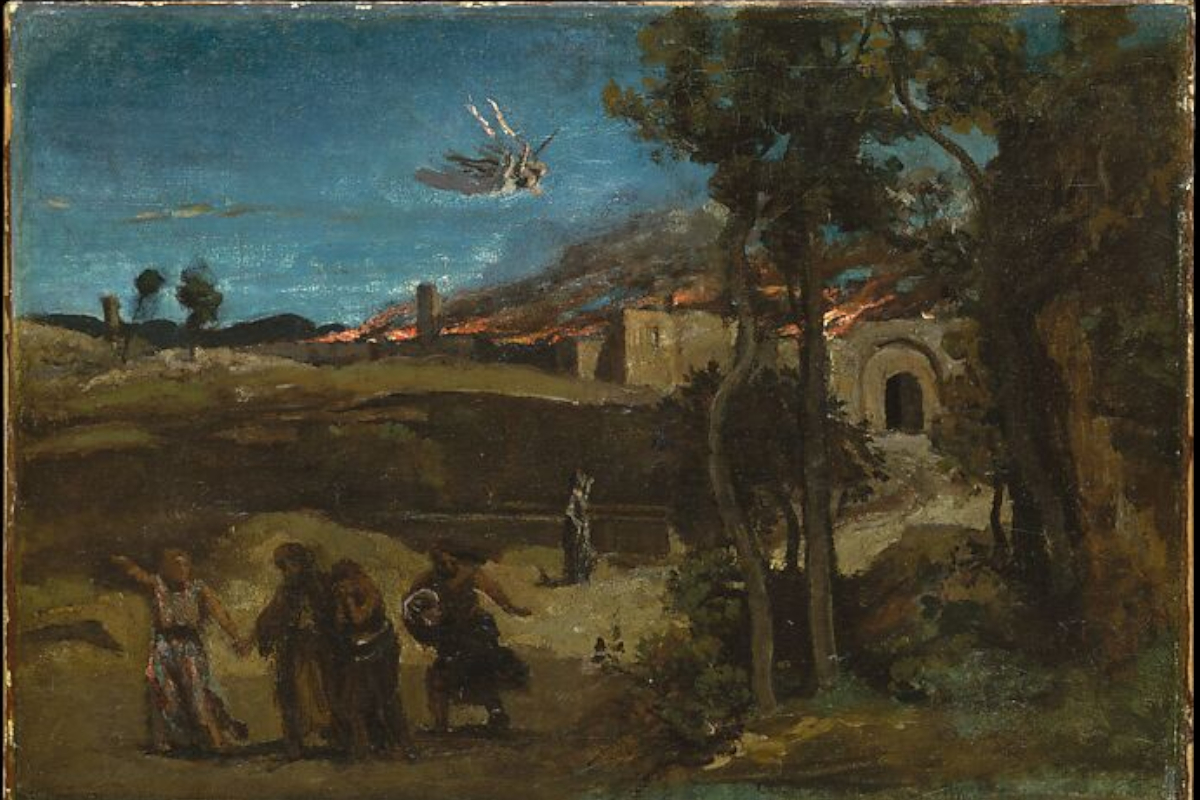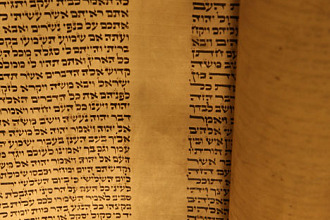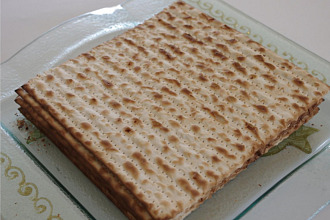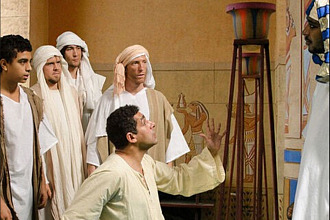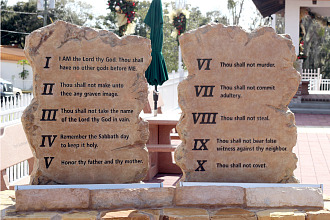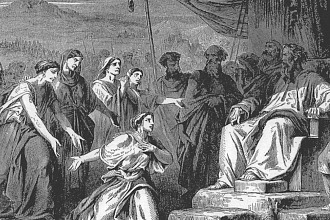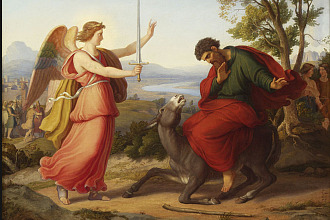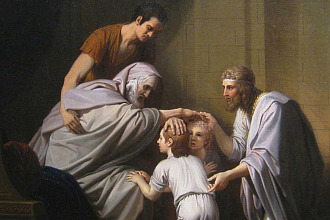Parasha for the Week: Vayera Genesis 18:1 – 22:24.
Haftara for the Week: 2 Kings 4:1 – 37.
Besorat Yeshua: Mark 10:41 – 52.
Overview
Avraham is visited by G-d. When two angels and God appear in human form, Avraham rushes to show them hospitality by bringing them into his tent. Sarah laughs when she hears from them that she will bear a son next year.
G-d reveals to Avraham that He will destroy Sodom, and Avraham pleads for Sodom to be spared. G-d agrees that if there are fifty righteous people in Sodom He will not destroy it. Avraham "pleads" G-d down to ten righteous people. However, not even ten can be found.
Lot, his wife and two daughters are rescued just before sulfur and fire rain down on Sodom and her sister cities. Lot's wife looks back and is turned into a pillar of salt. Lot's daughters fear that as a result of the destruction there will be no husbands for them. They decide to get their father drunk and through him to perpetuate the human race. From the elder daughter, Moav is born, and from the younger, Ammon.
Avraham moves to Gerar where Avimelech abducts Sarah. After G-d appears to Avimelech in a dream, he releases Sarah and appeases Avraham.
As promised, a son, Yitzchak, is born to Sarah and Avraham. On the eighth day after the birth, Avraham circumcises him as commanded. Avraham makes a feast the day Yitzchak is weaned.
Sarah tells Avraham to banish Hagar and Hagar's son Yishmael because she sees in him signs of degeneracy. Avraham is distressed at the prospect of banishing his son, but G-d tells him to listen to whatever Sarah tells him to do. After nearly dying of thirst in the desert, Yishmael is rescued by an angel and G-d promises that he will be the progenitor of a mighty nation.
Avimelech enters into an alliance with Avraham when he sees that G-d is with him.
G-d instructs Avraham to take Yitzchak and to offer him as a sacrifice. Avraham does this, in spite of ostensibly aborting Jewish nationhood. At the last moment, G-d sends an angel to stop Avraham. Because of Avraham's unquestioning obedience, G-d promises him that even if the Jewish People sin, they will never be completely dominated by their foes.
The parasha ends with the genealogy and birth of Rivka.
Being Hospitable
Avraham He was sitting at the entrance to his tent when three men approached. They were actually two malachim (angels) and God. Avraham invited them to join him and hurried to arrange a meal for them. He took butter and milk and the calf that he had prepared, and he set it before them... and they ate (Bereshit 18:8). Abraham and Sarah were known to be hospitable.
Talking is Easier Than Doing
Avraham invites three visitors to stay for a meal with the words: "I will fetch a morsel of bread that you may sustain yourselves, then go on" (Gen 18:5). Yet, Avraham does not give them just a crust of bread; he serves them a lavish multi-course feast. Why does Avraham use such a humble invitation? Wouldn't a more descriptive invitation have been more enticing?
In the Talmud (Bava Metzia 87a) the Sages derive from here the principle that the righteous say little and do much. The wicked, however, say much and do little (as we see next week with Efron's false assurances to Avraham when Avraham wants to bury his wife, Sarah).
Rabbi Yeruchem Levovitz, of the Mir Yeshiva, comments that talking about what you plan to do is negative. It is superfluous and often counterproductive. Talking is easier than doing. It creates expectations. And then, even with the greatest of intent, things happen which prevent doing. There is pleasure in talking about the good you intend to do, but it is a cheap way of getting honor and approval. Talking changes the focus from doing good for its own sake to doing good for the sake of approval—and there are those who make grandiose promises and then they forget, causing great heartache and pain.
Nothing is Impossible for G-d
The Torah states: "And the Almighty remembered Sarah as He said He would ... And Sarah conceived and bore Avraham a son in his old age" (Gen. 21:1-2). We read this section of the Torah on Rosh Hashanah to develop hope and trust in the Almighty. Nothing is impossible for Him. Sarah was already ninety years old, and according to all the standard rules of nature, it would have been impossible for her to give birth to Isaac.
Even when a situation seems bleak and the probability for salvation seems unlikely, do not give up hope. The salvation of the Almighty can come in the twinkling of an eye! The Almighty's law is more powerful than the law of averages. This awareness is so important for our daily lives that at the beginning of each year we repeat this message: Never despair!
The Mitzvah of Hospitality
Rabbi Levi Yitzchak of Barditchev was visiting in the city of Lemberg. He stopped at the home of one of the community leaders and asked if he could stay there for a few days. He was refused, but told to go to the end of the town; there he would find the home of a Torah scholar who was happy to welcome guests. Rabbi Levi Yitzchak went there and was welcomed with open arms. As Rabbi Levi Yitzchak was walking through the streets, someone recognized him as the famous Rabbi of Barditchev. Rumor spread fast, and many people came to speak with rabbi. The rich man, where the rabbi was originally refused lodging, also heard about it and came. As soon as he saw the rabbi, he almost fainted. Just a little while ago, the rabbi wanted to stay at his home and he was refused. With tears in his eyes, he begged the rabbi's forgiveness and pleaded that he come back and stay in his home. Rabbi Levi Yitzchak told him: We find in the Torah that Abraham and Lot were both very hospitable to their guests. "Inviting me now that you know who I am, is not how a Jew should perform the mitzvah of hospitality (Hachnasat Orchim). This Torah scholar, although a poor man himself, invited me happily into his home, not knowing who I was. He has the right idea about this important mitzvah and here is where I prefer to stay."
HAFTARA 2 Kings 4:1 - 37
The Second book of Kings tells us about the Ministry of Elisha and Gehazi his servant to an unnamed lady called the Shunammith, a native of Shunem, a place belonging to the tribe of Issachar. This place lies a short distance north of Jezreel at the foot of "Little Hermon."
Parasha: The Messenger who visited Abraham said: "I will surely return to you in due season, and your wife Sarah shall have a son" (Genesis 18:10).
Haftara: Elisha plays the role of the Messenger in this text. He said to the Shunammith: "At this season, in due time, you shall embrace a son." She replied, "No, my lord, O man of God; do not deceive your servant." The woman conceived and bore a son at that season, in due time, as Elisha had declared to her" (2Kings 4:16-17).
The next point about this haftara is that this story is special for its length and complexity. Usually the miracles in the First Testament are short and rare, but this text is an exception. Elisha wants to reward the Shunammith for her kindness to him. He not only promised to her that she will have a son, but later when this son died, he raised him from the dead.
Besorat Yeshua Mark 10:41 - 52
Parasha: Abraham was in contact with Abimelech. Abimelech was acting like Pharaoh, a dictator who did whatever pleased him. In spite of her old age, Sarah was still a very beautiful and attractive lady. Abimelech wanted to have intercourse with her. He was not interested in marriage, just pleasure. He took her without Abraham's permission. "And King Abimelech of Gerar sent and took Sarah" (Genesis 20:2). Women had no freedom at that time.
Besorah: In this portion of the Besorah, Yeshua knew that the Talmidim would be leaders in his new organization. He warned them against the temptation of power and dictatorship: "You know that among the Gentiles those whom they recognize as their rulers lord it over them, and their great ones are tyrants over them. But it is not so among you; but whoever wishes to become great among you must be your servant, and whoever wishes to be first among you must be slave of all" (Mark 10:42-44). Yeshua gave the example. He is the king of Israel, the Mashiach, but he came as a servant: "For the Son of Man came not to be served but to serve, and to give his life a ransom for many" (Mark 10:45).
Parasha: We have seen the miracles of Elisha in the Haftara. "Then he got up on the bed and lay upon the child, putting his mouth upon his mouth, his eyes upon his eyes, and his hands upon his hands; and while he lay bent over him, the flesh of the child became warm" (2Kings 4:34). The child awoke from the dead.
Besorah: The second part of this text is about miracles accomplished: They came to Jericho. As he and his Talmidim and a large crowd were leaving Jericho, Bartimaeus, a blind beggar, was sitting by the roadside. He said, "Y'shua, Son of David, have mercy on me!" Yeshua stood still and said, "Call him here." Then Y'shua said to him, "What do you want me to do for you?" The blind man said to him, "let me see again." Y'shua said to him, "Go; your faith has made you well." Immediately he regained his sight and followed him on the way" (Mark 10:46-52).

